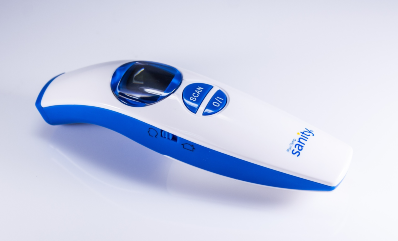
A fever by itself is typically not harmful or dangerous and is unlikely to cause brain damage or other problems. Even febrile seizures (a seizure triggered by a fever) aren’t normally dangerous. It’s important to note, also, that fever is not a disease or sickness in and of itself. Instead, it is a symptom that can accompany many childhood illnesses, especially infections. In general, you should make sure to call your pediatrician if your infant under three months of age has a rectal temperature above 100.4 F, if your infant aged 3-6 months has a temperature above 101 F, or if an infant above 6 months has a temperature above 103 F. For most older children, it is not so much the number but rather how your child is acting that is concerning. You don’t necessarily need to call your children’s doctor immediately if your older child is:
- alert, active and playful,
- not having difficulty breathing, and
- is eating and sleeping well.
That is why the old adage of “feed a cold, starve a fever” doesn’t really work. If your child has a fever and is hungry, let them eat! While a fever is a sign that your body is fighting an infection, lowering the fever will not make it take longer to get over the infection. Remember, a fever is a symptom — not a cause! You do not necessarily need to treat your child’s fever, but in most cases a fever can be treated as a comfort measure. In other words, treating a fever (especially one caused by an infection) will not help your child to get better any faster, but it may help make them feel better. If your child has a fever (especially if it is low grade) but does not feel bad, then you probably don’t need to give them a fever reducer. It is generally a good idea, however, to have them be seen by a local childrens doctor near you to determine the cause of the fever.

Treatment of a fever can include using an age-appropriate dose of an over-the-counter fever reducer, including products that contain acetaminophen (Tylenol) or ibuprofen (Motrin or Advil). If you child has an infection (which your local pediatrician will be able to confirm), using a fever reducer will not help your child to get better any faster, but they will probably make them feel better. You should also be sure to give your child a lot of fluids so that they do not get dehydrated. Keep in mind that treatment of a fever is usually to help your child feel better, so if he has a fever but doesn’t feel bad (especially if the fever is low grade) then you typically do not need to treat the fever.
One question that many parents ask is whether or not it is safe to alternate acetaminophen and ibuprofen. If you are using the correct dosage of each medicine given at the proper time intervals, then yes it is probably safe — although there is no research to prove that it actually helps. The most common problem with this approach is that it is easy to get confused and give an extra dose of one or the other medicines. If you are alternating fever reducers, then be sure to write down a schedule with the times that you are giving the medicines so that the correct medicine is always given at the correct time.
MacKoul Pediatrics is an amazing local pediatrics office in Cape Coral, FL where caring, compassionate doctors and nurses work with you to keep your children as healthy as possible. MacKoul cares for children from birth to college age, from Cape Coral, Fort Myers, Naples, and beyond.
December 10, 2014
 A fever by itself is typically not harmful or dangerous and is unlikely to cause brain damage or other problems. Even febrile seizures (a seizure triggered by a fever) aren’t normally dangerous. It’s important to note, also, that fever is not a disease or sickness in and of itself. Instead, it is a symptom that can accompany many childhood illnesses, especially infections. In general, you should make sure to call your pediatrician if your infant under three months of age has a rectal temperature above 100.4 F, if your infant aged 3-6 months has a temperature above 101 F, or if an infant above 6 months has a temperature above 103 F. For most older children, it is not so much the number but rather how your child is acting that is concerning. You don’t necessarily need to call your children’s doctor immediately if your older child is:
A fever by itself is typically not harmful or dangerous and is unlikely to cause brain damage or other problems. Even febrile seizures (a seizure triggered by a fever) aren’t normally dangerous. It’s important to note, also, that fever is not a disease or sickness in and of itself. Instead, it is a symptom that can accompany many childhood illnesses, especially infections. In general, you should make sure to call your pediatrician if your infant under three months of age has a rectal temperature above 100.4 F, if your infant aged 3-6 months has a temperature above 101 F, or if an infant above 6 months has a temperature above 103 F. For most older children, it is not so much the number but rather how your child is acting that is concerning. You don’t necessarily need to call your children’s doctor immediately if your older child is: Treatment of a fever can include using an age-appropriate dose of an over-the-counter fever reducer, including products that contain acetaminophen (Tylenol) or ibuprofen (Motrin or Advil). If you child has an infection (which your local pediatrician will be able to confirm), using a fever reducer will not help your child to get better any faster, but they will probably make them feel better. You should also be sure to give your child a lot of fluids so that they do not get dehydrated. Keep in mind that treatment of a fever is usually to help your child feel better, so if he has a fever but doesn’t feel bad (especially if the fever is low grade) then you typically do not need to treat the fever.
Treatment of a fever can include using an age-appropriate dose of an over-the-counter fever reducer, including products that contain acetaminophen (Tylenol) or ibuprofen (Motrin or Advil). If you child has an infection (which your local pediatrician will be able to confirm), using a fever reducer will not help your child to get better any faster, but they will probably make them feel better. You should also be sure to give your child a lot of fluids so that they do not get dehydrated. Keep in mind that treatment of a fever is usually to help your child feel better, so if he has a fever but doesn’t feel bad (especially if the fever is low grade) then you typically do not need to treat the fever.